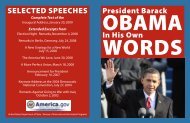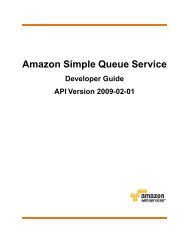obama
You also want an ePaper? Increase the reach of your titles
YUMPU automatically turns print PDFs into web optimized ePapers that Google loves.
Those men of Lexington and Concord were among our first<br />
patriots. And at the beginning of a week when we celebrate<br />
the birth of our nation, I think it is fitting to pause for a<br />
moment and reflect on the meaning of patriotism – theirs,<br />
and ours. We do so in part because we are in the midst of<br />
war – more than one and a half million of our finest young<br />
men and women have now fought in Iraq and Afghanistan;<br />
over 60,000 have been wounded, and over 4,600 have been<br />
laid to rest. The costs of war have been great, and the debate<br />
surrounding our mission in Iraq has been fierce. It is natural,<br />
in light of such sacrifice by so many, to think more deeply<br />
about the commitments that bind us to our nation, and to<br />
each other.<br />
Finally, it is worth considering the meaning of patriotism because<br />
the question of who is – or is not – a patriot all too often<br />
poisons our political debates, in ways that divide us rather<br />
than bringing us together. I have come to know this from my<br />
own experience on the campaign trail. Throughout my life, I<br />
have always taken my deep and abiding love for this country<br />
as a given. It was how I was raised; it is what propelled me into<br />
public service; it is why I am running for President. And yet, at<br />
certain times over the last sixteen months, I have found, for<br />
the first time, my patriotism challenged – at times as a result<br />
of my own carelessness, more often as a result of the desire by<br />
some to score political points and raise fears about who I am<br />
and what I stand for.<br />
We reflect on these questions as well because we are in the<br />
midst of a presidential election, perhaps the most consequential<br />
in generations; a contest that will determine the<br />
course of this nation for years, perhaps decades, to come.<br />
Not only is it a debate about big issues – health care, jobs,<br />
energy, education, and retirement security – but it is also a<br />
debate about values. How do we keep ourselves safe and<br />
secure while preserving our liberties? How do we restore<br />
trust in a government that seems increasingly removed from<br />
its people and dominated by special interests? How do we<br />
ensure that in an increasingly global economy, the winners<br />
maintain allegiance to the less fortunate? And how do we<br />
resolve our differences at a time of increasing diversity?<br />
52 53<br />
So let me say at this at outset of my remarks. I will never question<br />
the patriotism of others in this campaign. And I will not<br />
stand idly by when I hear others question mine.<br />
…<br />
The use of patriotism as a political sword or a political shield is<br />
as old as the Republic. Still, what is striking about today’s patriotism<br />
debate is the degree to which it remains rooted in the<br />
culture wars of the 1960s – in arguments that go back forty<br />
years or more. In the early years of the civil rights movement<br />
and opposition to the Vietnam War, defenders of the status<br />
quo often accused anybody who questioned the wisdom of<br />
government policies of being unpatriotic. Meanwhile, some
















